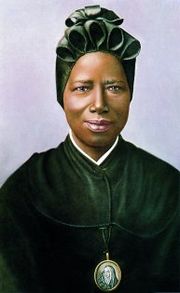Josephine Bakhita
| St. Josephine Margaret Bakhita, F.D.C.C. | |
|---|---|
 |
|
| Born |
ca. 1869 Olgossa, Darfur, Sudan |
| Died | 8 February 1947 Schio, Veneto, Republic of Italy |
| Venerated in | Roman Catholic Church |
| Beatified | 17 May 1992, St. Peter's Basilica, Vatican City, by Pope John Paul II |
| Canonized | 1 October 2000, St. Peter's Basilica, Vatican City, by Pope John Paul II |
| Feast | 8 February |
| Patronage | Sudan |
Josephine Margaret Bakhita, F.D.C.C., (ca. 1869 – 8 February 1947) was a Sudanese-born former slave who became a Canossian Religious Sister in Italy, living and working there for 45 years. In 2000 she was declared a saint by the Catholic Church.
She was born around the year 1869 in the western Sudanese region of Darfur; in the village of Olgossa, west of Nyala and close to Mount Agilerei. She belonged to the prestigious Daju people; her well respected and reasonably prosperous father was brother of the village chief. She was surrounded by a loving family of three brothers and three sisters; as she says in her autobiography: "I lived a very happy and carefree life, without knowing what suffering".
Sometime between the age of seven to nine, probably in February 1877, she was kidnapped by Arab slave traders, who already had kidnapped her elder sister two years earlier. She was cruelly forced to walk barefoot about 960 kilometers (600 mi) to El Obeid and was already sold and bought twice before she arrived there. Over the course of twelve years (1877–1889) she was resold again three more times and then given away. It is said that the trauma of her abduction caused her to forget her own name; she took one given to her by the slavers, bakhita, Arabic for lucky. She was also forcibly converted to Islam.
In El Obeid, Bakhita was bought by a very rich Arab from Arab slave traders who used her as a maid in service to his two daughters. They liked her and treated her well. But after offending one of her owner's sons, possibly for breaking a vase, the son lashed and kicked her so severely that she spent more than a month unable to move from her straw bed. Her fourth owner was a Turkish general and she had to serve his mother-in-law and his wife who both were very cruel to all their slaves. Bakhita says: "During all the years I stayed in that house, I do not recall a day that passed without some wound or other. When a wound from the whip began to heal, other blows would pour down on me."
...
Wikipedia
